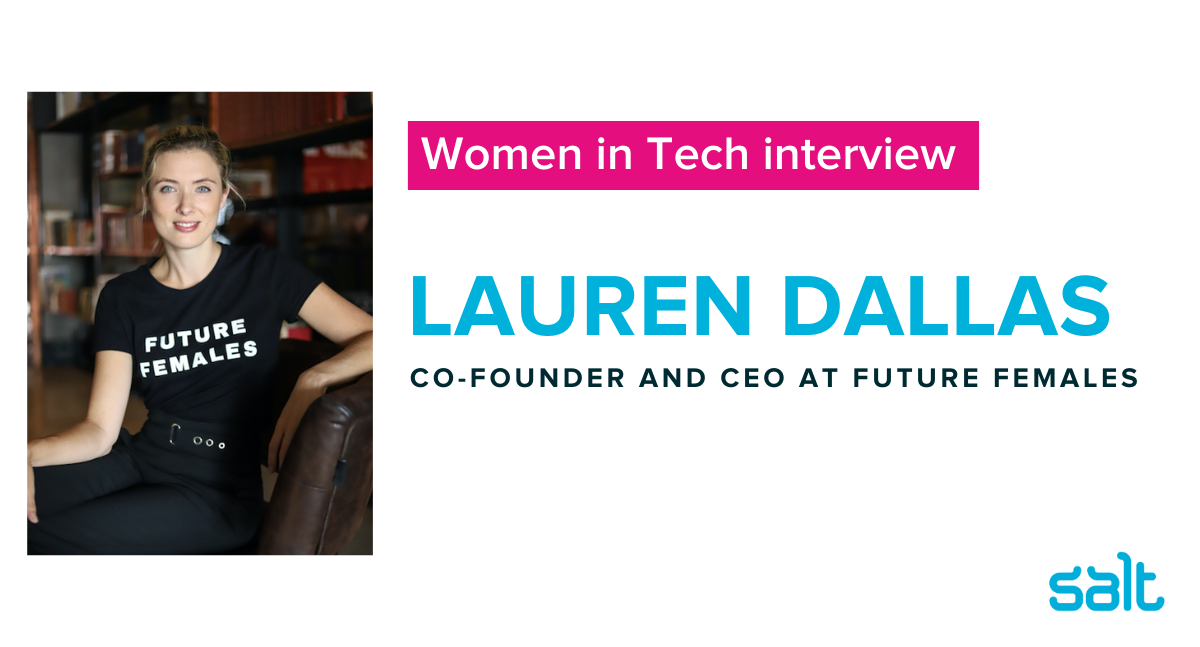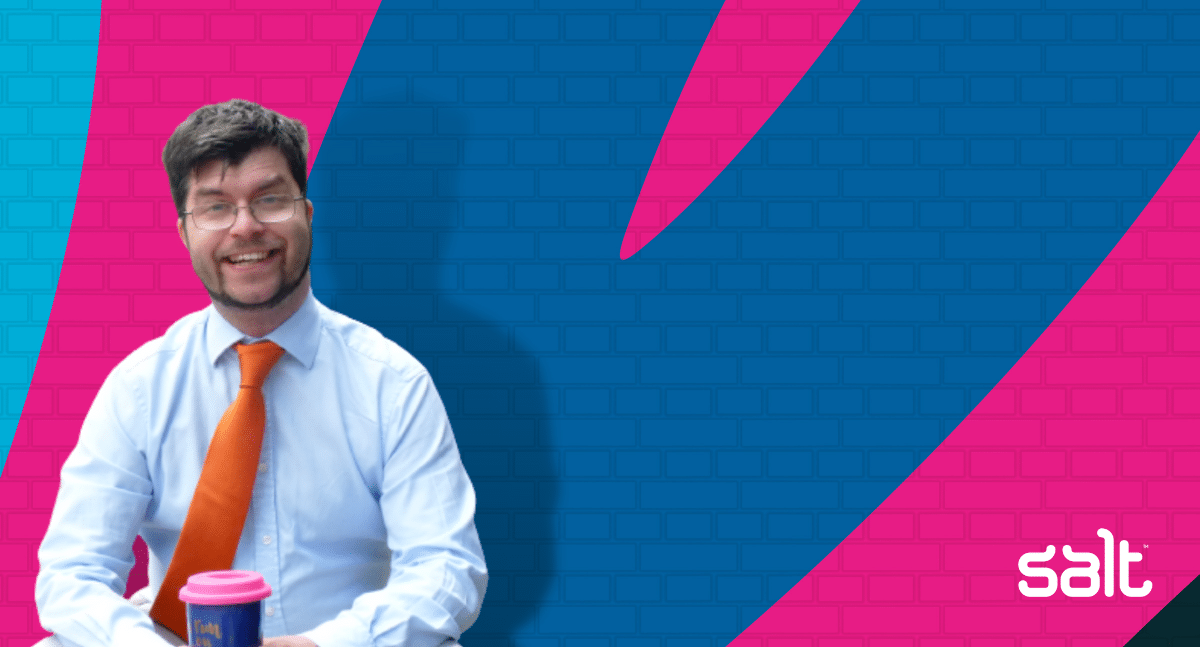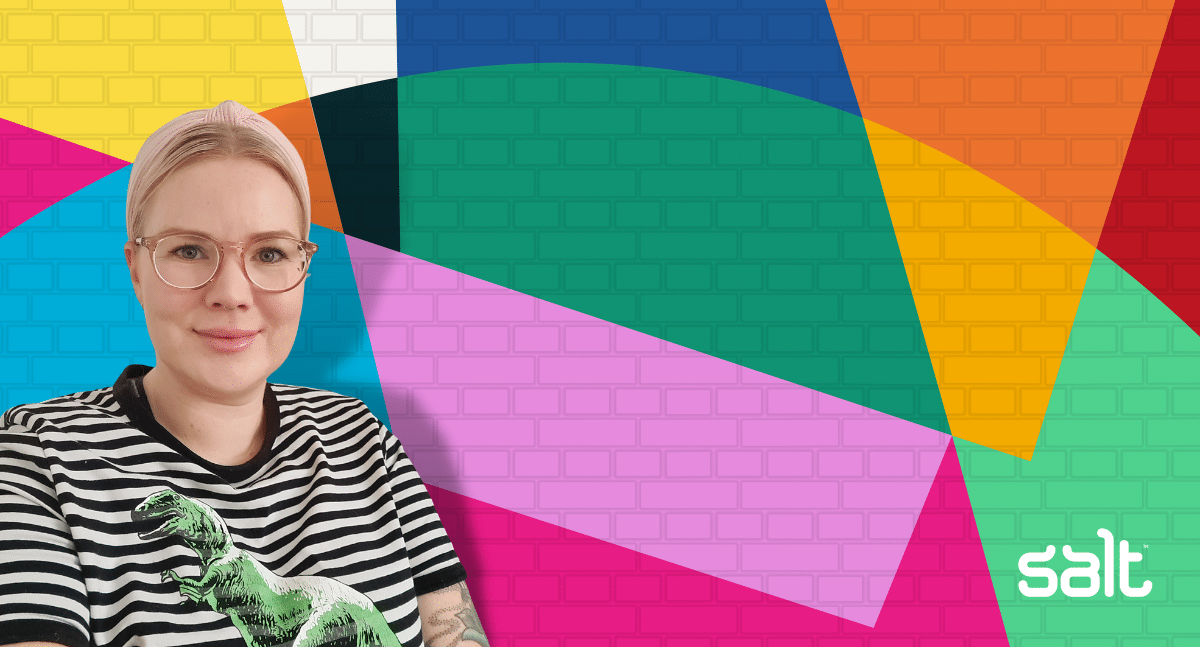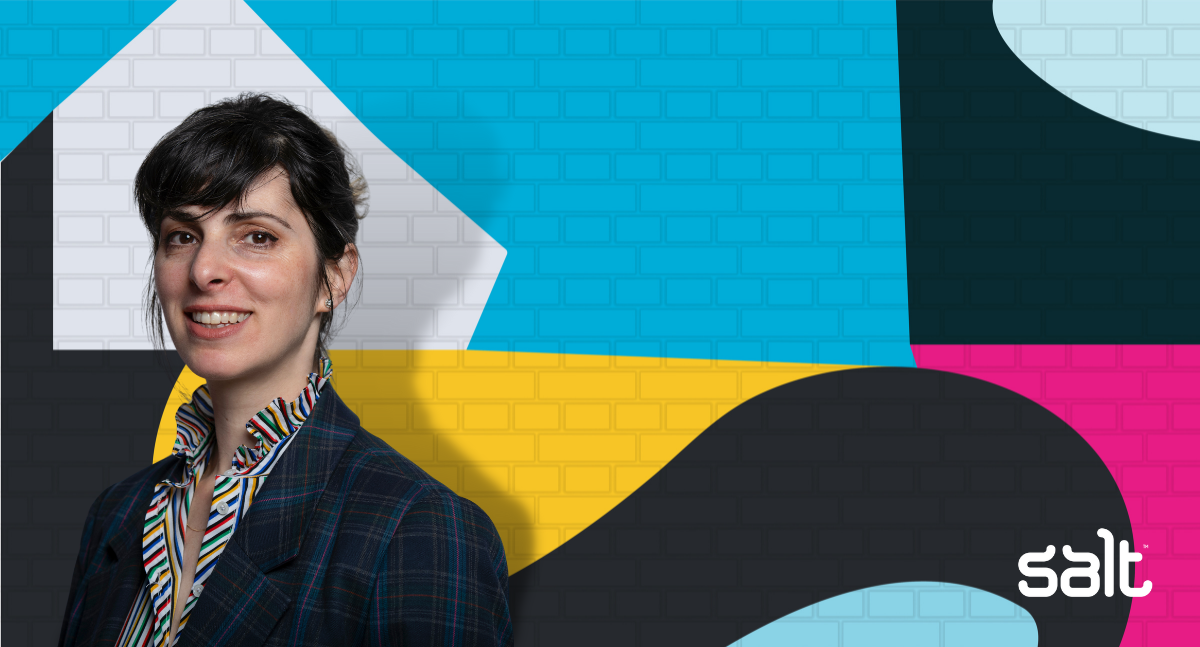
For Salt’s latest Women in Tech interview, we spoke to Dina Mohammad-Laity, Director of Data Science at Talabat, to discuss creativity in data, her best piece of advice, paving the way for other women to succeed and lots more.
What is the most exciting part of your job?
One of the most exciting parts of being Director of Data Science is the variety. You get to tackle a really broad range of topics and with that variety comes working with different people. You get to meet everyone across the business, and you end up being a conduit of information as well as getting to learn from a variety of perspectives. You can start pulling together connections that other people might not have and you are able to create lots of ideas from being able to have this macro view of meeting different people and hearing about their problems, which is really exciting.
Then, on the application side I think solving novel problems is a big reason that I enjoy my job. We’re really lucky at Talabat as we’re in the Middle East where there are issues that actually haven’t been solved before, or at least not with the level of localisation that leads to a truly great solution.
It’s great starting from zero as it gives you the opportunity to think and to be quite creative, which is one of my main motivations for loving my career; it’s a very creative endeavour, which you might not realise when you think of data/tech. You’re finding solutions that not only answers the question but also answers the question in a way that fits with other aspects that are going on in a rapidly moving business. I truly believe you have to have a creative, growth mindset to excel at this job.
What has been your most career defining moment that you are proud of?
If you’d asked me a few years ago I would have said ego-based things. When I was around 23 years old, I got an ‘outstanding entry’ award for Media Week’s 30 under 30. I remember at the time thinking “this is cool, I’ve made it!”. Then in the past few years, I’ve spoken at a few high-profile conferences, my team won an industry award, however none of these are what I’d say are career defining moments.
I read this quote which said something like ‘your life will be measured by the quality of your relationships’. So, with that respect, what’s most defining to me career-wise has been every step I’ve been able to take to get to the position I’m in now where I get to work with the team that I work with, because I am so inspired and motivated by my team.
I know it might seem a bit of a woolly answer, but I think for me the most defining thing is that I get to work with amazing people that I find inspiring, and every project I’ve done on the way has contributed to that, like a series of stepping stones leading me along this path.
I sometimes question whether I should be putting the team in for awards, or should I be writing more articles and trying to go viral and then I think would any of it be meaningful to me? I’m taking such value from my day-to-day interactions with the people I work with that that’s what brings meaning, so I love that. It’s all about finding joy at work!
I think in today’s society success can be measured on how many followers and likes you have or whether you’ve gone viral on social media but that might not be fully meaningful to everyone. There are influencers that are amazing and inspiring, but even then these metrics are likely not their goals rather the means to get there.
There are a lot of data science people teaching skills on YouTube and I’m positive their goal is not to get views alone. I’m sure the goal for them is to educate and share what they know, so it’s purposeful. I’m really thankful that I’ve been able to identify what gives me purpose at work as that is key.
What do you think we should be doing more of to encourage more girls to consider a career in tech, and in particular data?
There are a few things, like representation and having more women in the field. Cassie Kozyrkov leads Decision Intelligence at Google and she teaches these amazing, very accessible classes on data science and machine learning. She’s brilliant, she explains herself so well and she’s very feminine, she’s very much a woman talking about these technical topics.
Another thing that I think would be really good is articulating what attributes women tend to bring to the table that might be different and beneficial. The habit of comparing yourself to others can be problematic – we have our own unique combination of strengths and weaknesses and that should be celebrated. It’s been proven that different perspectives bring better outcomes: if you have teams with the same views, same education, same background, they’re likely to come to pretty similar conclusions and maybe won’t be challenged whereas women and other under-represented groups bring different perspectives that make the whole greater than the sum of the parts.
Women are consumers of technology just as much as our male counterparts. It’s how we frame conversations around technology to younger girls so use familiar apps or websites, make it clear ‘this is tech’ and that they could make something similar, or other things that they might want to see. It makes the tech part more relatable, I think.
What challenges have you faced in the workplace, especially in male-dominated environments?
My entire career has been in male-dominated environments, however I’ve noticed a lot more women coming into the tech industry now, and into data in particular.
There are a couple of challenges that come to mind. The first one has been a topic of discussion with some of my colleagues recently and it’s simply about being heard. Making sure you were heard in meetings could be difficult before Covid, especially if you’re more softly spoken but you could use your body language to create a space then. However, over Zoom it’s got tougher as it seems louder voices get picked up or noticed more. I was chatting to some of my female colleagues and they’d noticed a similar shift. It’s not on purpose, of course, so we can identify this potential bias and do something about it. I personally like to go around alphabetically on Zoom calls to make sure that everyone has a clear space to speak, and it helps those who are a bit more shy to contribute their ideas – both men and women!
Something my colleagues and I have also been talking about more openly recently is imposter syndrome, but not just with women. There are more men talking about imposter syndrome as well. I actually had someone in an interview answer a question about personal growth and he said to me “I know I’m a talented person, but I have really bad imposter syndrome”. It was the first time I’d ever had this conversation with a stranger and had never heard someone saying that before so openly. I really respected him for that, making himself vulnerable and opening up an important topic.
I think that’s something that definitely can be exacerbated in a male-dominated environment is imposter syndrome, especially if you work in a ‘boys club’ type culture; self-doubt can creep in. I think that’s why it’s really good to have womens’ networks to support you and help rally your confidence.
In your opinion, what is the biggest deterrent to women succeeding in the workplace?
This is a tough one, because I feel like a relatively successful person and I can only talk about my own experiences and what I have encountered or observed in my biased perspective. Feedback I’ve heard from a few colleagues is that women have to work twice as hard for the same recognition, and women of colour even harder still.
There are systematic cultural habits in place like limiting stereotypes such as ‘male equals leadership’ or ‘men take charge, women take care’. You can end up feeling like you’re stuck in between a rock and a hard place. You can be seen as being too hard and too soft at the same time – how do you win? Because if you are too hard, you’re called bossy and other negative stereotypes and if you’re too soft you’re classed as a walk-over.
There are sometimes systematic barriers in place to getting high-visibility jobs and I think women don’t naturally try to grab the ‘big shiny projects’. We tend to pick up the very important foundational work that we know needs to be done, or end up expending energy on ‘office housekeeping’. I know I’ve done that before so I try to consciously take ownership of high-vis projects where I was like ‘I’ll get this one myself’.
Do you think you’ve grown in confidence then to be able to do that and take on a big project?
Absolutely. You have to be brave, and be open to failing – nobody gets it right the first time. I think it’s good to watch how other people operate and are able to get the ‘big’ projects as that’s a type of talent in itself. Understanding social dynamics and organisational agility are very important, and I believe you should never underestimate the value of social capital as it can go a long way. Making sure you form good, meaningful and genuine relationships with people in the business as the more people you know, and you get on with and understand, the better you understand the business that you work in and the different perspectives can be beneficial to you too.
You graduated during the economic crisis. What advice do you have for people in a similar situation now graduating during the pandemic?
It’s tough but unfortunately, we have to play the hand we’re dealt. There are two things I’d say to people graduating now; firstly to be brave and lean in, really feel the scale of this situation because I think that will make you more resourceful and more resilient over time which are great attributes for you, not just professionally, but also personally. I believe tough experiences aid personal growth; you do come out stronger on the other side. Remember diamonds are formed under immense pressure!
The second thing is that these difficult times where everything’s changing is also a time and opportunity to be creative. There are new businesses popping up, businesses and people are taking more risks and using that resilience and bravery to do something different. I believe that one of the biggest attributes that will serve you well throughout your whole career, and life in general, is grit and now is the time to practice it.
Allow your brain time to process that this is a horrible situation, no one person can handle it, and that it’s okay if you’re overwhelmed with the situation. Try to keep focus on what you can positively affect now.
Talabat introduced a grocery delivery service as an experiment early last year and it is now responsible for a good % of revenue. Can you talk about this in more detail including the impact Covid has had on Data and your role at Talabat?
The grocery service is a really good example of what I mentioned earlier about this period being defined by rapid change, and to just try something and see how it goes. New industries are forming out of thin air – it’s inspiring!
When it comes to the data topic, this past year or so has been strangely positive. I saw someone describe 2020 as the ‘year of data and data viz’. There’s never been so many people interested in data, even if we go to the basics of monitoring how many Covid cases there are, how they are being measured, and how we compare across different countries. I originally considered going into medical statistics and epidemiology so I’ve been fascinated that all of a sudden so many people are talking about data as a dinnertime topic.
In industry right now there’s definitely a push for a much deeper understanding of data, to make up for 2020 performance in many cases. I always say from the data there are two things that you could possibly do: you can figure out a way to make more money or you can figure out a way to save money. I think we’re going to see some really creative applications of data coming our way soon.
In a management position, how have you found it best to promote and nurture women in the workplace?
My team is relatively diverse at the moment, in data we do have a better representation of women than other tech careers overall. For me, it’s about highlighting and celebrating the team’s achievements and attributes and tying them into regular coaching conversations. For example, saying ‘the reason that you were so good on this project wasn’t just because of your technical prowess, which is amazing, but you’re also a great collaborator and you’re such a good listener and that’s how you manage to understand how these things could be resolved’. I think highlighting attributes as being positive and something to be proud of is really important.
Obviously your skillset is important, but we need to avoid treating soft skills as second-class citizens. With women, we should highlight collaborating over competing, and figuring out how to move forward, not necessarily be the best. Business outcomes, which are vital for how we operate, are the things that get celebrated publicly but positive environments where people can lean on each other because there is this trust, and these attributes are equally important as it creates a psychologically safe environment. This has definitely helped throughout our recent unprecedented times.
What I also try to remember and remind my colleagues is that it’s not just about having a diverse team but ensuring there is inclusion. I once read this quote: ‘diversity is making sure everyone gets a dinner invitation and inclusion is making sure that everyone enjoys the meal’. That really stuck with me as it makes you think ‘how do we make a working environment that works for everyone?’. It means hiring people with similar core principles, which also helps remove toxic traits in a workplace. I think making sure that people are bringing their full selves to work and encouraging them to be themselves is important – that’s why we have them on the team in the first place.
What are some of the best and worst workplace initiatives you have seen or heard of to help promote diversity?
The best ones I think are just making sure the foundations are covered; making sure that you know your talent acquisition pipeline contains women and you’re not writing job descriptions that sound macho or exclusive. Neutralising job titles is an interesting topic here – there’s research to show that women are less likely to apply for jobs that have superlative titles, such as ‘Expert’, ‘Specialist’ or ‘Pro’. I actually once applied for a job that was titled ‘Data Wizard’ and, in my application, I said “hello, I am a witch, I hope that’s okay”. To be fair, they did reply, and I think it’s important to highlight some of these accidental biases – be an upstander.
Accessible role models are also important to help promote diversity. I try to make myself accessible to more junior people in the company and community as a whole, particularly people that might be looking to move into the data industry.
I really believe that hell has a special place for women that kick down the ladder after they’ve climbed up. I’ve seen this behaviour a few times, and it does upset me. It’s on us to try and set the scene and make it easier for younger women to come in and progress. Then they’ll do the same, and then over time more women will naturally be in leadership positions. It won’t be novel anymore! It won’t happen overnight but next year will be better than this year, and that keeps me motivated.
The worst initiatives are sometimes the ones that are actually well-meaning. Something I’ve witnessed before is someone saying they want to hire more women and when asked why they said ‘because it’s company policy’. People need to understand and explain the value as it can result in hiring managers accidentally creating a non-inclusive environment or even worse it might become toxic. I’d be mortified if I heard someone say I was only hired ‘for company policy’. It doesn’t only apply to women, it’s for people from all different backgrounds. We need to articulate the value of, and celebrate diversity.
Who is your modern-day hero?
There are so many brilliant and smart people around to be inspired by, but I’m currently obsessed with Stacey Abrams. She’s an American politician in the Democratic party. In 2018, she ran to be governor of Georgia, where she missed out on winning, due to voter suppression. Instead of giving up, she led this amazing effort of grassroots organisation to rally people together and to get people who were previously disenfranchised from voting to sign up and made sure the message was out there.
She ended up being the reason that the state flipped from Republican to Democrat in the general election and a lot of the credit was to her and her team. The reason I find her so motivating and inspirational was because she had this strong focus which I think oftentimes we don’t give enough credit to. She had a huge goal that she was trying to achieve unabashedly, and it must have been a decade of walking up a really hard, really steep hill carrying a heavy weight. Again, it comes down to grit. She said in an interview that people think this took three years, but actually it took a decade of hard work. We can all learn something from her.
As well as your degree and masters, you taught yourself Python amongst many other things by reading and studying books. Do you have any recommendations on how to stay up-to-date or learn more about data?
You can’t go wrong with a good textbook and there’s a great range out there. I’d suggest checking the O’Reilly range, and there are lots of blogs on data science on Medium which I subscribe to like Towards Data Science, and the AirBnb data blog. I just love that people put themselves out there, sharing their projects, the steps taken and outcomes to help people learn. I also follow quite a lot of people on Twitter, it’s a very engaged data science community, which can also be great for finding interesting jobs.
I am so envious of people learning data now; I wish we’d had the online tools that are available today. They’re transformational! I’d recommend anything hands-on where you can learn by failing such as Codecademy, DataCamp and DataQuest. Another way to hone your skills is to do your own side projects. Ask a question, find some data and make the data answer the question. Go through that process over and over, and each time find messier data and ask a harder and broader question.
What is your biggest stress reliever?
Generally I turn to creative projects – using a different part of my brain makes me feel refreshed! I enjoy dressmaking and I’m learning how to play the piano using an app. I also like painting, I do embroidery sometimes and I love cooking – you’ve got to eat anyway so you might as well make an activity out of it!
Is there any advice you wish somebody gave you at the beginning of your career?
It’s okay to be your authentic self. Your perspective and who you are is the value that you bring to the table. Also it’s important to know your worth, and to be brave and comfortable enough to fail.
For people in data science my one piece of advice would be to have a focus on value, so don’t necessarily chase the new shiny methodology, chase the value. If you can get there with the shiny approach, then that’s great – otherwise prioritise value creation over everything else because that’s how you’ll create your stepping stones forward. It’s also important to carve out and protect time to learn new approaches and keep your skills sharp.
What job did you dream of when you were a kid – your Plan A career path?
I wanted to be a pilot and as a young kid my Dad said to me you can’t be a pilot because ‘Women are not pilots!’. Maybe that’s some foundational motivation for me these days.
Fun fact about you?
I went on my honeymoon to Antarctica, which in itself is a little unusual but it’s also how I adopted a vegan lifestyle. Witnessing climate change up close, just seeing chunks of the continent falling off, it was quite a jarring experience. When I got back to dry land, I was Googling things I could do to help as an individual, thinking it’d be changing my car, but overall a lot of the information I found said that by reducing your intake of meat you can reduce your impact on the planet, and I’ve been a vegan ever since! My favourite cookery book is Jack Monroe ‘Vegan-ish’ which is accessible with ingredients you probably already have in the cupboard


